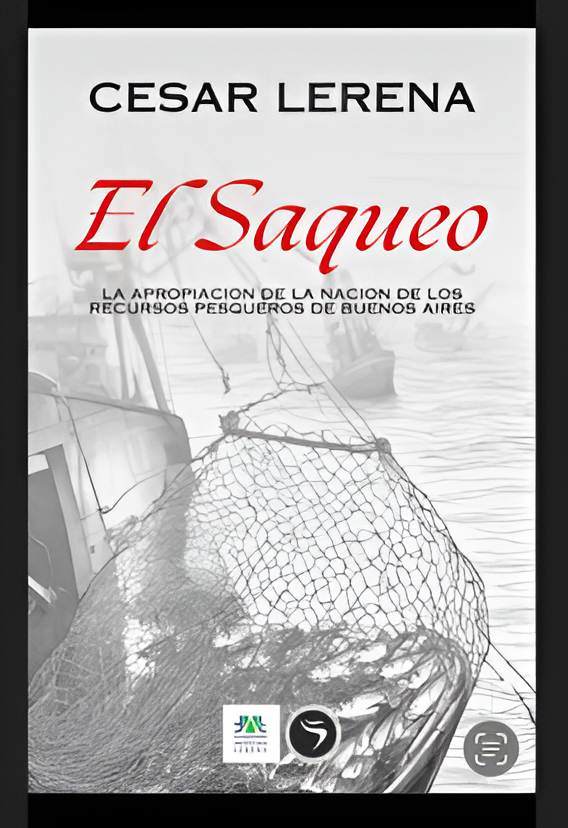El experto en Atlántico Sur y Pesca, César Augusto Lerena permite que Agenda Malvinas, divulgue gratuitamente su reciente investigación, reunida en su último libro: El Saqueo: La apropiación de la Nación de los Recursos Pesqueros de Buenos Aires"; donde no solo denuncia el despojo de estos recursos por parte del Estado Nacional, sino que también alerta sobre las peligrosas consecuencias de esta centralización para la sostenibilidad y el bienestar de las comunidades locales.
Una obra fundamental para comprender los desafíos que enfrenta la provincia de Buenos Aires y las cuatro restantes con quien comparte las aguas del Atlántico Sur, y las implicancias a largo plazo que desencadenarán las políticas actuales.
La centralización del poder pesquero: ¿Qué está en juego?
Desde el comienzo, Lerena pone en claro que la centralización del control sobre los recursos pesqueros por parte del gobierno nacional es el núcleo del problema. Históricamente, las provincias argentinas han tenido dominio sobre sus recursos naturales, un derecho consagrado en la Constitución Nacional. Sin embargo, en las últimas décadas, el Estado Nacional ha centralizado este control, desplazando a las provincias, y particularmente a Buenos Aires, de la gestión de sus propios recursos.
Este despojo no es meramente simbólico; tiene consecuencias reales y devastadoras para los ecosistemas marinos y las economías locales. La gestión centralizada ha favorecido prácticas de pesca que no consideran las particularidades locales ni la capacidad de regeneración de las especies. Así, la provincia de Buenos Aires se encuentra en una posición vulnerable, con sus recursos explotados para beneficiar a intereses que muchas veces no se alinean con los de la provincia.
El impacto ambiental: Un mar en declive
Uno de los puntos más alarmantes que Lerena destaca es el impacto ambiental que ésta centralización ha tenido en los recursos pesqueros. La sobreexplotación de especies clave como la merluza ha alcanzado niveles preocupantes, y la falta de una regulación efectiva ha permitido que técnicas de pesca destructivas, como la pesca de arrastre, sigan devastando los ecosistemas marinos. Estas prácticas no solo afectan a las especies objetivo, sino que también tienen un impacto colateral en toda la biodiversidad marina, alterando los equilibrios ecológicos y poniendo en riesgo la salud a largo plazo del Atlántico Sur.
El libro advierte que, si no se implementan cambios significativos, estamos encaminados hacia un colapso ecológico que podría ser irreversible. Buenos Aires, que históricamente ha dependido de estos recursos, podría ver cómo su mar se convierte en un desierto biológico, incapaz de sostener tanto a las especies como a las comunidades que dependen de ellas.
Las comunidades pesqueras: El rostro humano del saqueo
Más allá de las implicaciones ecológicas, "El Saqueo" también hace hincapié en las consecuencias sociales y económicas de esta centralización. Las comunidades pesqueras de Buenos Aires, que han sido pilares económicos y culturales de la región, están siendo desmanteladas por estas políticas. Las grandes corporaciones pesqueras, respaldadas por el Estado Nacional, dominan la industria, mientras que los pescadores locales luchan por sobrevivir en un entorno cada vez más adverso.
La pérdida de empleos, el aumento de la pobreza y la migración forzada son solo algunos de los efectos devastadores que esta situación ha traído a las comunidades costeras. Estas políticas no solo están empobreciendo a quienes dependen de la pesca, sino que también están erosionando el tejido social de la provincia, destruyendo formas de vida que han existido durante generaciones.
¿Hacia dónde debe dirigirse Buenos Aires?
Ante este sombrío panorama, la pregunta clave es: ¿Qué se puede hacer? Lerena propone una serie de medidas que podrían revertir la situación y asegurar la sostenibilidad de los recursos pesqueros de Buenos Aires. Entre ellas, destaca la necesidad de devolver a las provincias el control sobre sus recursos, implementar políticas pesqueras basadas en la ciencia y fortalecer la lucha contra la pesca ilegal.
Vale decir, para el caso exclusivo de la provincia de Buenos Aires; que necesita recuperar su capacidad para gestionar sus recursos de manera sostenible, protegiendo tanto al medio ambiente como a las comunidades que dependen de él. Esto requerirá no solo cambios en la legislación, sino también un compromiso fuerte y sostenido de parte de todos los actores involucrados.
Conclusión: Un llamado a la acción
"El Saqueo" es un llamado de atención urgente ante Las políticas centralistas del Estado Nacional que han puesto en peligro no solo los recursos pesqueros, sino también el futuro de las comunidades costeras. Es imperativo que se tomen medidas inmediatas para revertir esta situación y asegurar que los recursos pesqueros se gestionen de manera que beneficie a todos, no solo a unos pocos.
De tal manera, para Lerena; la preservación de los recursos pesqueros de Buenos Aires no es solo una cuestión de justicia ambiental, sino también de justicia social. Las generaciones futuras dependen de las decisiones que se tomen hoy. Por ello, es crucial que la provincia recupere el control y promueva una gestión equitativa y sostenible de sus recursos; puntualiza el mayor experto que tiene la Argentina en materia de Atlántico Sur y Pesca.







